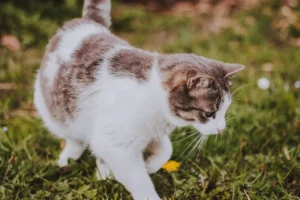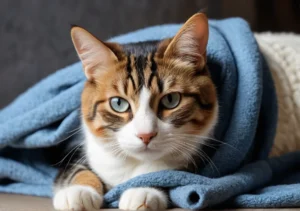Cats can be mysterious creatures, often leaving us wondering why they act the way they do. One common question that many cat owners have is: why are cats mean to kittens?
When it comes to this behavior, there are a few key reasons why cats may be mean to kittens. Let’s take a closer look at some of the possible explanations for this seemingly harsh behavior.
Natural Instincts: Exploring the Wild Roots
Cats have a long history of being independent hunters, instinctively wired to survive in the wild. This natural instinct can often manifest as aggression towards kittens, as cats may see them as potential competitors for resources. In the wild, cats have to protect their territory and ensure their own survival, which can lead to them being mean to kittens in a bid to establish dominance.
Another crucial aspect of cats’ natural instincts is their strong maternal instincts. While mother cats are known for being nurturing towards their own offspring, they may not always extend the same level of care and protection to unrelated kittens. This can result in aggressive behavior towards kittens that are not their own, as they prioritize their own genetic lineage and survival.
Territory and Hierarchy: Establishing Dominance
Cats are territorial animals by nature, defining their space and boundaries to establish a sense of security. When kittens enter the picture, a cat’s territorial instincts may kick into high gear, leading them to display aggressive behavior. This can be their way of asserting dominance and maintaining control over their living environment.
Moreover, cats also operate within a hierarchical structure, with each feline determining their rank within the social order. When kittens are introduced, older cats may feel compelled to assert their dominance and maintain their position within the hierarchy. This can result in them being mean to kittens as a way to establish and maintain their status within the group.
In summary, understanding cats’ natural instincts and their need to establish territory and hierarchy can shed light on why they may exhibit mean behavior towards kittens. By recognizing these innate behaviors, cat owners can better navigate and address any conflicts that may arise between adult cats and kittens in their household.
Lack of Socialization: The Importance of Early Experiences
Cats can be mean to kittens due to a lack of socialization during their formative weeks. It’s crucial for kittens to have positive interactions with other cats, humans, and different environments to learn social cues and boundaries. Without proper socialization, adult cats may not know how to interact appropriately with kittens, leading to aggressive behavior. If a cat was isolated or had negative experiences during its early weeks, it might struggle to understand how to behave around kittens, which can result in hostility.
One way to address this is by gradually introducing the adult cat to the kittens in a controlled environment. Supervised interactions can help the adult cat learn how to interact with the kittens in a positive and non-threatening manner. Providing plenty of positive reinforcement, such as treats and praise, can also help the adult cat associate kittens with positive experiences.
Additionally, creating a safe space for the kittens where they can retreat if the adult cat becomes aggressive is essential. This safe space should have food, water, and a comfortable bed to ensure the kittens feel secure. By addressing the lack of socialization and providing guidance and support, you can help foster a more positive relationship between adult cats and kittens.
Stress and Anxiety: Understanding Cat Emotions
Stress and anxiety can play a significant role in a cat’s behavior towards kittens. Cats, like humans, can experience a range of emotions, including stress and anxiety, which can manifest in aggressive behavior towards kittens. Cats may feel stressed or anxious due to changes in their environment, such as moving to a new home, the addition of a new pet, or loud noises.
If a cat is experiencing stress or anxiety, it may take out its frustrations on the kittens, displaying aggressive behavior. To help alleviate stress and anxiety in cats, providing a stable and predictable environment is key. This includes maintaining a consistent daily routine, offering plenty of enrichment, such as toys and scratching posts, and creating safe spaces where the cat can retreat and relax.
In addition, using calming techniques, such as pheromone diffusers or music designed for cats, can help reduce stress levels in feline companions. By understanding and addressing the underlying causes of stress and anxiety in cats, you can help create a more harmonious environment for adult cats and kittens to coexist peacefully.
Motherly Protection: A Mother’s Instincts
When it comes to understanding why cats can sometimes be mean to kittens, it’s essential to consider the powerful force of a mother’s instincts. Mother cats have a strong drive to protect their territory and offspring from potential threats. This instinct traces back to their wild ancestors, who had to fend off predators to ensure the survival of their young.
In the wild, any sign of weakness or vulnerability could attract predators, so mother cats are hardwired to be vigilant and protective. This may manifest as aggression towards kittens to teach them survival skills, establish boundaries, or keep them in line. While it may seem harsh to us, it’s a demonstration of the mother cat’s dedication to ensuring the safety and wellbeing of her kittens.
Additionally, mother cats may display aggressive behavior if they perceive a threat to their kittens, whether real or imagined. This could include perceived threats from other animals, unfamiliar scents, or even well-meaning humans approaching the kittens. In such cases, the mother cat’s protective instincts kick in, leading to defensive or aggressive behavior.
Understanding and respecting a mother cat’s instinctual behaviors can help foster a harmonious relationship between her and the kittens. Providing a quiet, secure environment for the mother and her offspring, as well as giving her space and time to care for the kittens in peace, can help alleviate potential aggression towards the kittens.
Learning from the Experts: Cat Behavior Specialists’ Insights
Cat behavior specialists provide valuable insights into the complex dynamics between mother cats and kittens. They emphasize that what may appear as “mean” behavior from a mother cat towards her kittens is often rooted in natural instincts and communication methods.
One key insight from cat behavior specialists is that mother cats use a range of behaviors to communicate with their kittens, including vocalizations, body language, and gentle nips. While these behaviors may seem aggressive to us, they are part of the mother cat’s way of teaching and disciplining her young.
Another important aspect highlighted by specialists is the role of hierarchy within a cat family. Mother cats establish themselves as the leaders of the family unit and set boundaries for the kittens to follow. This hierarchy helps maintain order and discipline within the cat group, ensuring the survival and well-being of the kittens.
To facilitate a positive relationship between mother cats and kittens, specialists recommend providing enriching environments, plenty of resources, and understanding the natural behaviors of cats. By creating a supportive and stress-free atmosphere for the mother cat and her kittens, we can help reduce the likelihood of aggressive behaviors and promote a nurturing environment for the entire cat family.
Breaking Stereotypes: Not All Cats Are Mean to Kittens
Contrary to popular belief, not all cats exhibit mean behavior towards kittens. While some cats may show aggression or territorial tendencies towards kittens, it’s essential to recognize that each cat is an individual with its own unique personality and behavior. Factors such as breed, socialization, past experiences, and overall temperament can influence how a cat interacts with kittens.
Some cats may even display nurturing and protective behaviors towards kittens, acting as surrogate parents or fostering positive relationships. It’s crucial to observe and understand the dynamics between cats and kittens in a specific environment before making assumptions about their behavior.
Building Positive Relationships: Tips for Introducing Cats and Kittens
Gradual Introduction: Introducing cats and kittens slowly and gradually can help reduce stress and prevent aggressive behavior. Start by scent-swapping items like bedding or toys to familiarize them with each other’s scent before physical introductions.
Supervised Interactions: Monitor interactions between cats and kittens closely, especially during the initial introductions. Separate them if any signs of aggression or tension arise, and gradually increase their time together as they become more comfortable.
Safe Spaces: Provide separate spaces for both cats and kittens to retreat to when needed. Ensure each pet has their own food, water, litter box, and resting area to prevent resource guarding and territorial disputes.
Positive Reinforcement: Reward positive interactions between cats and kittens with treats or praise to encourage bonding and mutual respect. Creating positive associations can help build trust and foster a harmonious relationship over time.
Patience and Persistence: Building a positive relationship between cats and kittens takes time and patience. Be consistent in your approach, and don’t rush the process. With time and gradual introductions, many cats can learn to coexist peacefully with kittens.
By implementing these tips and strategies, cat owners can help facilitate a smooth and positive relationship between their cats and kittens, promoting harmony and companionship in the household. Remember, every cat is unique, and it’s essential to approach introductions with understanding, patience, and compassion.
Fun Facts About Cats and Kittens
Cats have a natural hunting instinct, which may explain why they can be tough on kittens. They might see them as playthings or prey, rather than as offspring. This behavior is rooted in their wild ancestry.
Interestingly, kittens begin to learn essential skills from their mothers at a very young age. This includes hunting, grooming, and even social behavior. So, when cats are rough with kittens, it could be their way of teaching them survival skills in the wild.
On a lighter note, did you know that cats have a specific purr just for communication with humans? It’s true! They have a special purr that they use to get our attention or ask for food. It’s like their way of speaking to us!
Help is Available: Seeking Professional Guidance
If you notice aggression or hostility between your adult cat and kittens, it’s crucial to seek professional guidance. A veterinarian or animal behavior expert can provide valuable insights and techniques to address the issue effectively. Ignoring the problem could lead to serious harm or stress for the kittens.
Remember, cats are complex creatures with individual personalities and behaviors. Seeking professional help can make a significant difference in understanding and improving their relationship dynamics. It’s essential to prioritize the well-being of all your feline companions.
In addition to professional guidance, creating a safe and nurturing environment for your cats and kittens can also help mitigate any aggressive behaviors. Providing plenty of toys, scratching posts, and separate spaces for each cat can reduce tension and promote harmony in your feline family.
Alex, a passionate animal lover, has experience in training and understanding animal behavior. As a proud pet parent to two dogs and three cats, he founded AnimalReport.net to share insights from animal experts and expand his knowledge of the animal kingdom.




